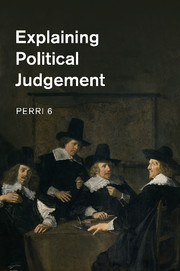Book contents
- Frontmatter
- Contents
- Figures
- Tables
- Acknowledgements
- Epigraph
- Chapter 1 On political judgement
- Chapter 2 The need for richer explanation
- Chapter 3 A Durkheimian theoretical framework
- Chapter 4 October 1962, before and after
- Chapter 5 The Khrushchev régime
- Chapter 6 The Kennedy administration
- Chapter 7 The Castro revolutionary régime
- Chapter 8 Implications
- Chapter 9 Coda
- Notes
- References
- Index
Chapter 6 - The Kennedy administration
Published online by Cambridge University Press: 07 October 2011
- Frontmatter
- Contents
- Figures
- Tables
- Acknowledgements
- Epigraph
- Chapter 1 On political judgement
- Chapter 2 The need for richer explanation
- Chapter 3 A Durkheimian theoretical framework
- Chapter 4 October 1962, before and after
- Chapter 5 The Khrushchev régime
- Chapter 6 The Kennedy administration
- Chapter 7 The Castro revolutionary régime
- Chapter 8 Implications
- Chapter 9 Coda
- Notes
- References
- Index
Summary
Individualistic institutions and networks
By late 1962, the prevailing informal institutions governing relations between the principal actors in policymaking within the White House were significantly more individualistic than was the case in the Kremlin. This individualism was played over the ground bass of hierarchical organisation, including the powers of the presidency, departments of state, the civil service and the armed forces.
However, individualism was a permanent feature neither of the White House nor of Kennedy's period there. Under Eisenhower, the National Security Council was a highly hierarchical structure (Bowie, 2001; George, 1980; Neustadt, 1990 [1980, 1960]). Kennedy found the Eisenhower National Security Council system too formal and bureaucratic, preferring something much looser (George, 1980; Sorensen, 2001). By the time of his presidency, ‘Kennedy thought in terms of people, rather than structure or organisation’ (Dallek, 2003, 307).
In 1961, the decision-making that led to the Bay of Pigs fiasco is widely thought to have emerged from enclaving in the policymaking group. The Bay of Pigs decision was one of the case studies against which Janis’ (1982 [1972]) celebrated ‘groupthink’ model was developed: groupthink is just one very particular type of enclaved small group process. Asking himself, ‘How could I have been so stupid?’ (Dallek, 2003, 367), Kennedy recognised that the decision-making process had been flawed, and deliberately changed the structures and relations subsequently to limit the degree of enclaving among his staff (e.g. Dallek, 368 ff.), although he neither sought nor realistically could have sought to mitigate enclaving among some services and agencies. After the Bay of Pigs, ExComm was an exception to Kennedy’s preferred pattern of bilateral meetings with each of his departmental secretaries. Indeed, even cabinet meetings were relatively uncommon (Dallek, 2003, 546).
- Type
- Chapter
- Information
- Explaining Political Judgement , pp. 202 - 244Publisher: Cambridge University PressPrint publication year: 2011



